Last updated on October 4th, 2025 at 02:55 pm
This summer breeze crochet triangle shawl is versatile enough to wear at the beach while relaxing or over your shoulders in a beautiful evening gown in the evening. Beyond its functionality, this shawl is a joy to create. The lightweight cotton yarn is comfortable to work with and perfect for spring, summer, and fall projects. Plus, its lacy texture makes it an excellent gift for friends or family who will treasure its handmade charm.
Use one skein of yarn to make this light and lacy triangle shawl.
Made with a number 2 weight cotton yarn cake, this shawl features a stunning gradient effect that transitions effortlessly through beautiful shades. Its generous dimensions—79 inches wide and 28 ½ inches long at the center—offer endless styling possibilities. Wear it draped over your shoulders as a traditional wrap, tie it around your neck like a chic scarf, or even style it as a sarong for a beach-ready look!
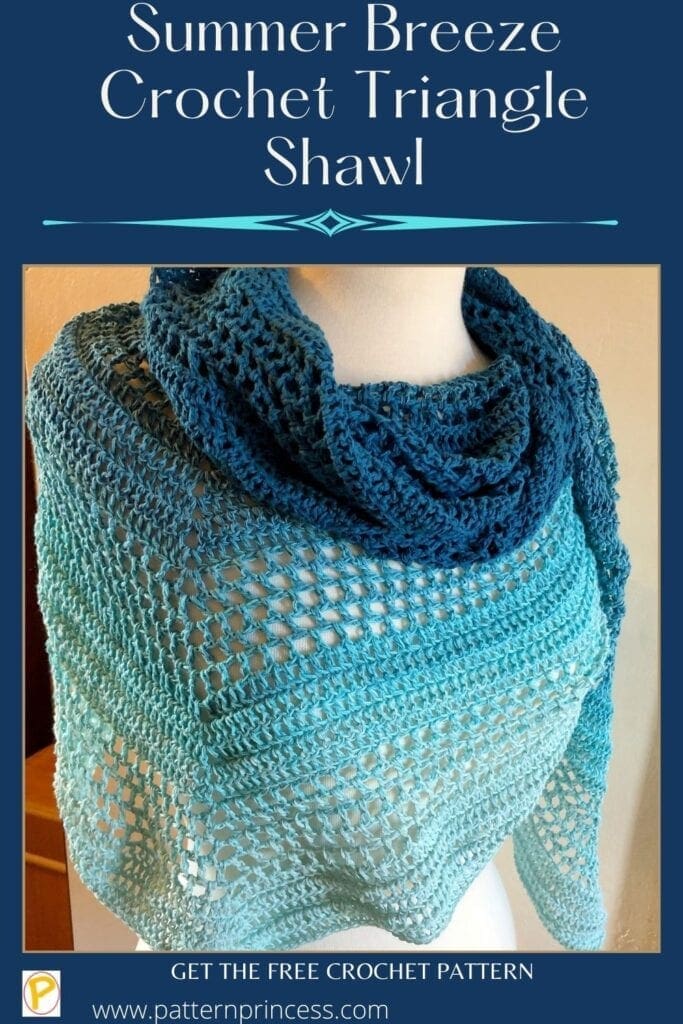
Easy Beginner Crochet Shawl Pattern
A handmade triangle shawl is more than just a cozy accessory. It’s a versatile piece that can elevate your wardrobe in countless ways.
This gorgeous shawl design, worked with simple double crochet and chain stitches, is perfect for crocheters of all skill levels. It is worked from the top down with the stitches increasing with each row.
Its lightweight and airy texture make it ideal for layering, whether you’re dressing up for a night out or adding a casual touch to your everyday outfit.
Making a shawl is a great way to use a yarn cake. It is fun to see what color comes next as I crochet a piece with yarn that has various colors throughout. When the yarn changes color with this fingering type yarn, it changes one thread at a time. So delicate and pretty; when paired with simple crochet stitches the results are exquisite.
Another bonus to using a yarn cake that has a gradient yarn color is the two yarn ends to be weaved in. Since the colors are chosen for you, all you do is keep crocheting. Not having to change yarn colors also means less yarn ends to weave in.
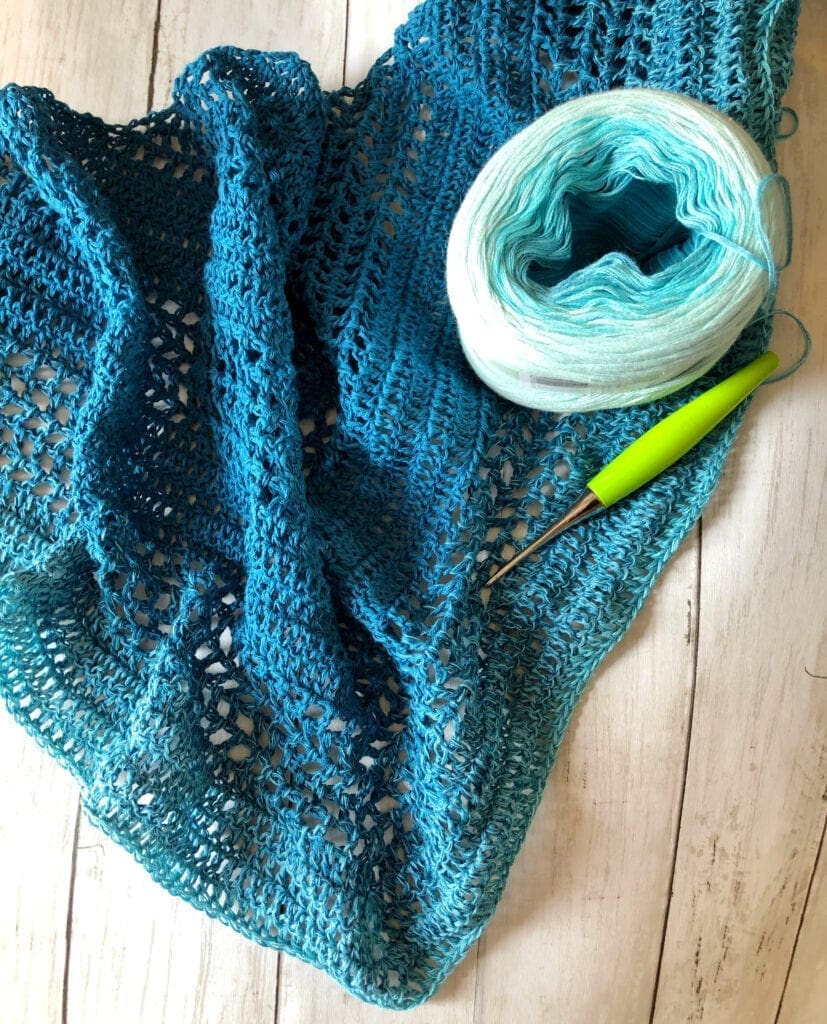
What do you Call a Yarn that Changes Color?
Gradient is the term that is most often used for yarn that gradually changes color from lighter shades to darker or vice-versa. Gradient yarns can gradually change color one strand at a time, or each strand can be colored the same with the colors throughout the skein of yarn changing as you work through the yarn.
Other terms that I have heard used to describe yarn that changes color are self-striping yarn, ombre yarn, and variegated yarn.
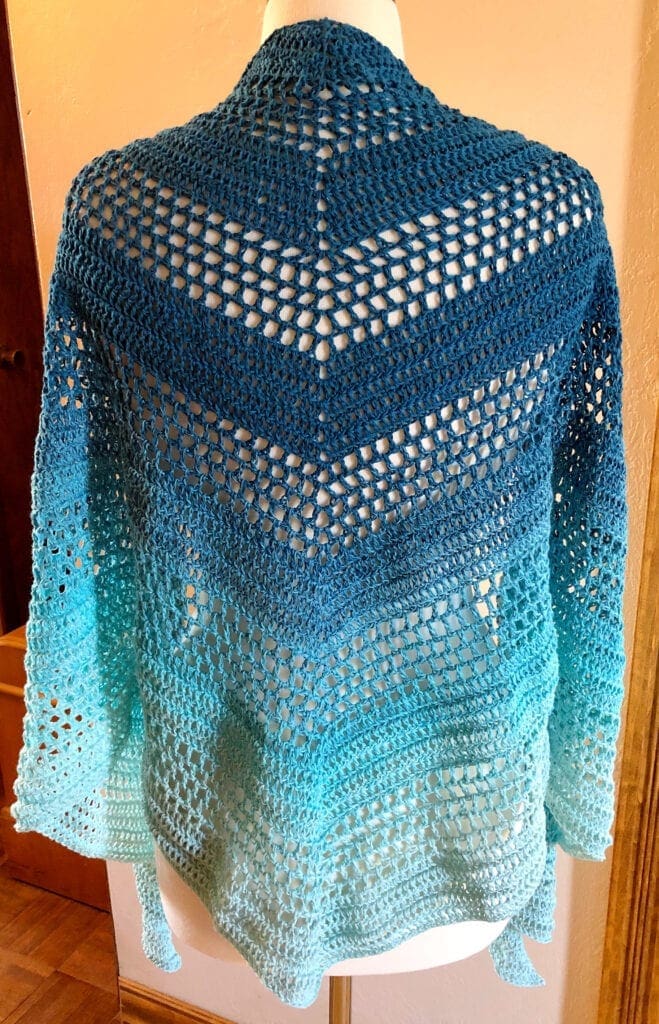
Triangle Shawl Crochet Pattern Using Fingering Yarn
Sometimes using a fine yarn can be a bit intimidating and making a lacy crochet project might seem out of your reach. I am here to tell you that it is easier than you may think.
I too was a bit apprehensive about using a fingering yarn. However, I fell in love with the color schemes and bought a handful of skeins on sale. When ever I would look through my yarn and plan my next project, I would take them out and look at their beauty just to put them back again. Finally, I made my first shawl and once I got started using this lighter weight yarn, I fell in love with it. This “Beginner Shawl” pattern was the first one I made with fingering yarn.
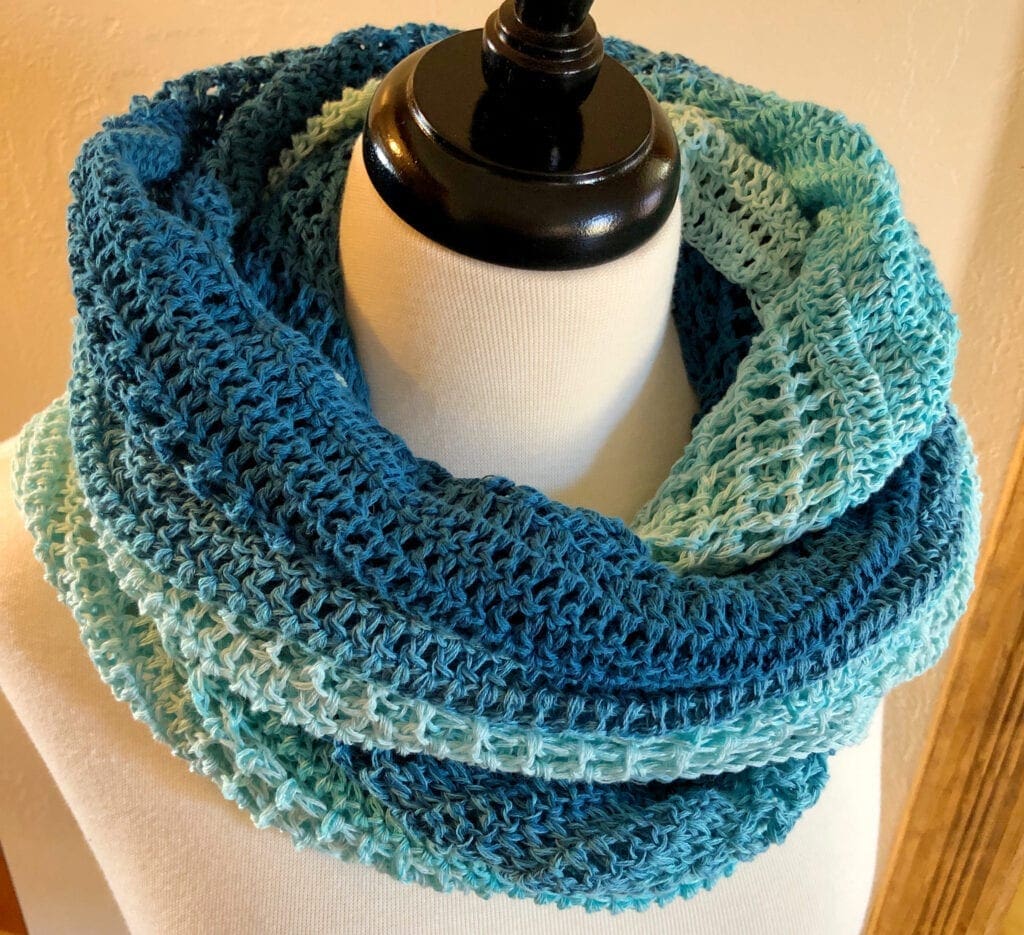
Whether you’re looking for a new crochet project or a versatile accessory to enhance your wardrobe, this triangle shawl is a must-make. Let’s get started and watch your creativity take shape.
Video Tutorial
Sometimes it is just nice to see the pattern being worked. For those of you that learn better from a video, I have that for you. The first seven rows will be worked with a bit thicker yarn to help show the stitches. After this section on the video, I also show this shawl being worked with the fingering yarn.
If you are a beginner at crochet and may have only crocheted a square or blanket, I recommend that you check out the video tutorial to help with understanding how to work this pattern. You can find the video after the written pattern.
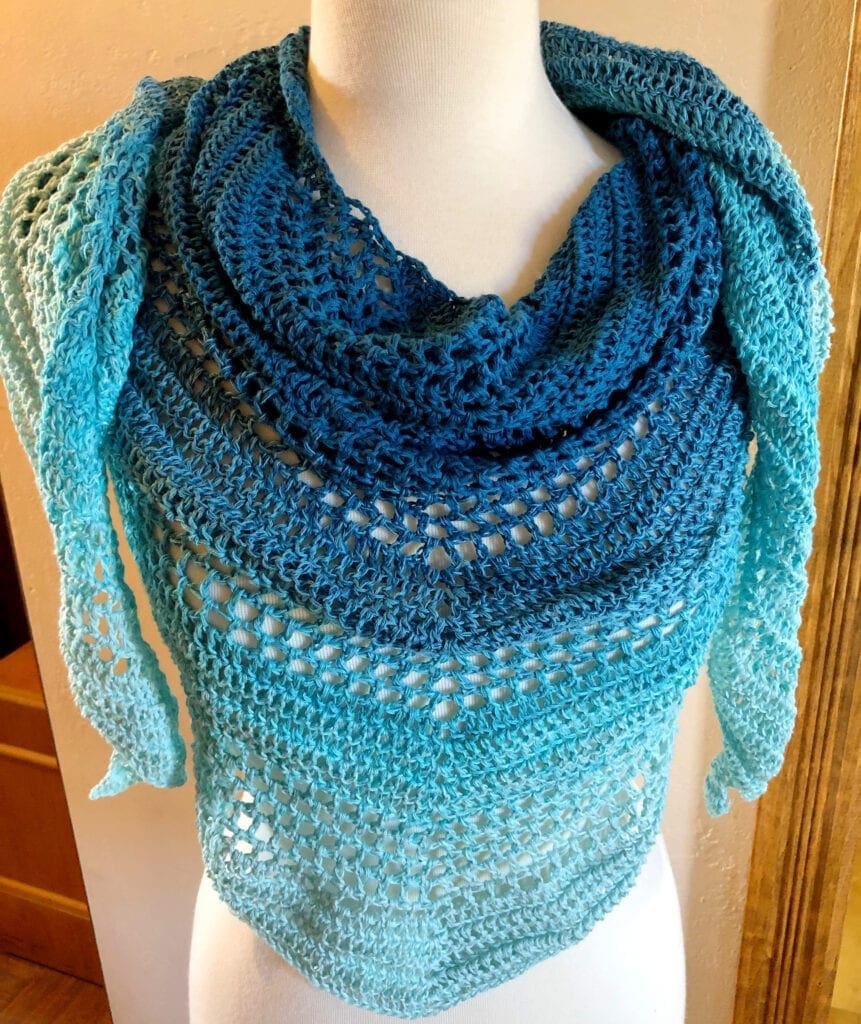
Directions: Summer Breeze Crochet Triangle Shawl
Skill Level
Advanced Beginner. You should be familiar with the chain stitch and double crochet stitch.
Gauge
Gauge is not critical to this crochet pattern. I had 25 stitches to 4 inches
Size
The shawl measures 79 inches at the widest point and 28 ½ inches long in the center from the middle tip to the starting point.
Materials
Cotton Kings Twirls yarn cake color number 10 from Hobbi. It is a number 2 fine fingering yarn. I used most of the 874 yards of the yarn in the skein.
Crochet Hook Size E
Yarn Needle
Scissors
If you are not able to find this yarn, you can find it from Hobbii. Make sure to check out our savings center page.
Abbreviations
- CH = Chain Stitch
- DC = Double Crochet
- SC = Single Crochet
- SK = Skip
- SL ST = Slip Stitch
- SP = Space
- ST = Stitch
- STs = Stitches
- [ ] = Repeat Between
Summer Breeze Triangle Shawl Crochet Pattern Notes
This pattern is written in US Terms.
The first chain 3 of each row counts as a double crochet.
Double crochet stitches are worked around the chain stitches rather than inserting the hook in through the loops.
The last stitches of the row are made in the third chain (top chain) of the previous row initial chain 3.
I will have the stitch counts for the rows; however, if you decide to make this shawl larger here are the increases. Each double crochet and chain stitch row increased by 4 stitches. Each double crochet row increases by 6 stitches.
Crochet Pattern Directions
Begin
Ch 4, SL ST into the first ST to make a circle. (If you prefer, you could start with a magic circle; however, I generally start my shawls with the chain 4 method as I have outlined because I think it provides a bit more security that the yarn will not break).
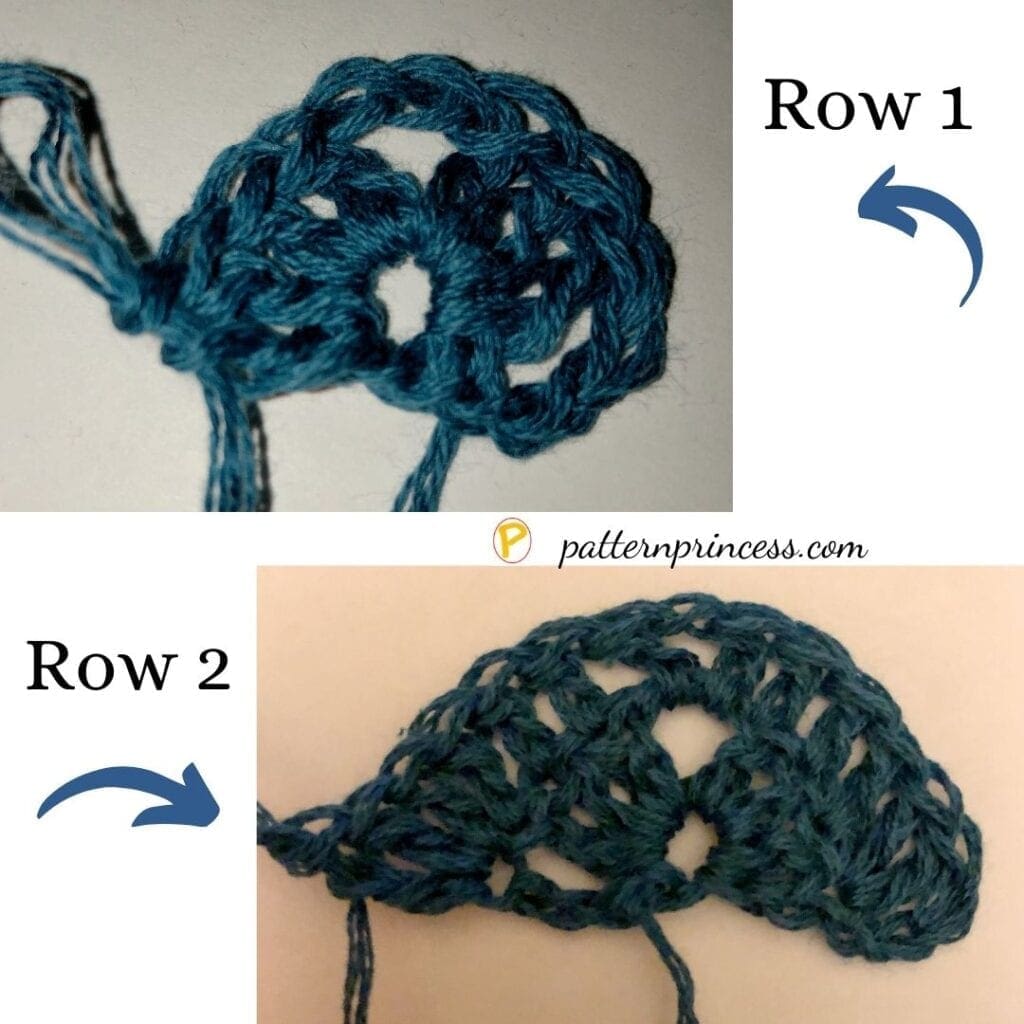
Row 1
CH 3 (Counts as DC). 3 DC in the ring, CH 2, 4 DC in the ring. Turn (8 DC, 2 CH SP)
Row 2
Ch 3 (Counts as DC). 2 DC in the same ST. DC in the next 3 STs. In the previous row CH 2 SP work (DC, CH 1, DC). DC in the next 3 STs. 3 DC in the last ST. Turn (14 DC, 1 CH SP)
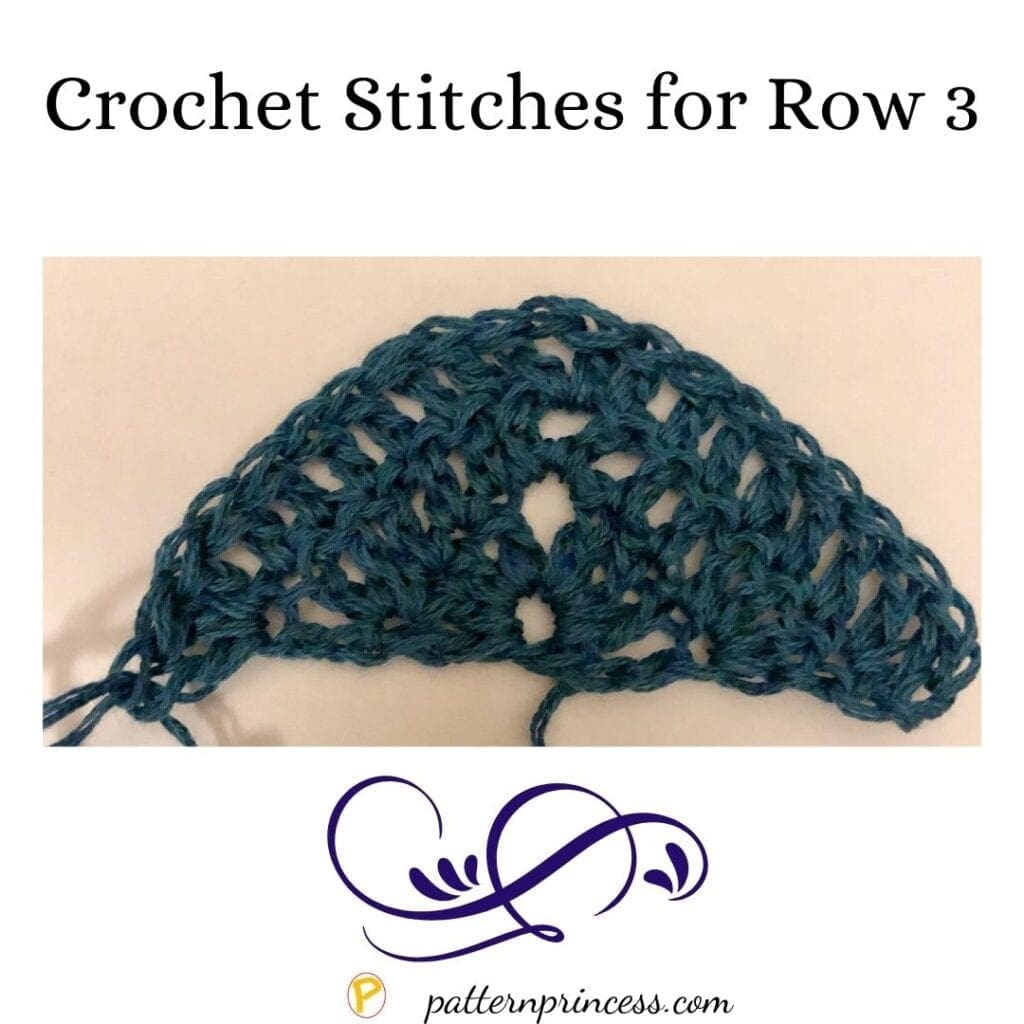
Row 3
CH 3 (Counts as DC). 2 DC in the same ST. DC in each ST across until you reach the previous row CH 1 SP. Work (DC, CH 1, DC) in the CH 1 SP. Continue working 1 DC in each ST across ending with 3 DC in the last ST. Turn (20 DC, 1 CH SP)
Row 4
Repeat row 3 (26 DC, 1 CH SP)
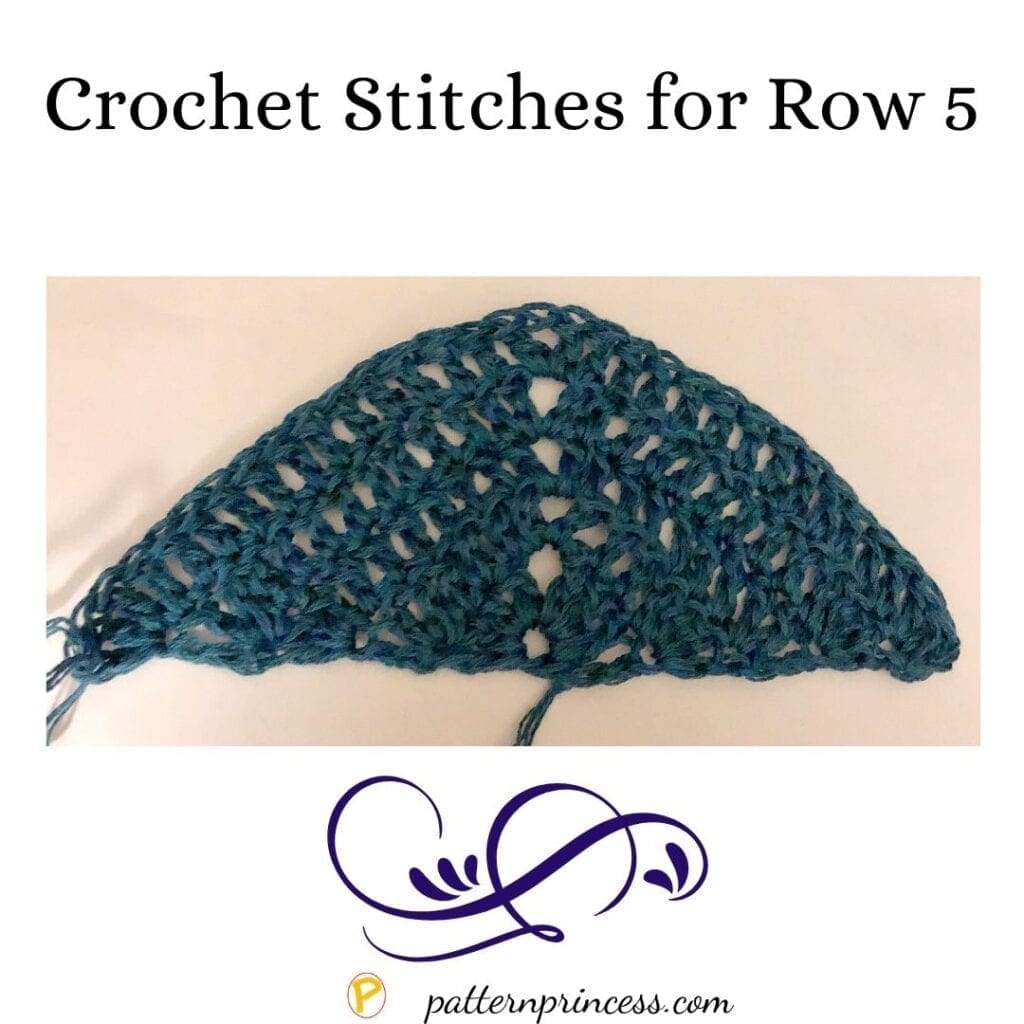
Row 5
Repeat row 4 (32 DC, 1 CH SP)
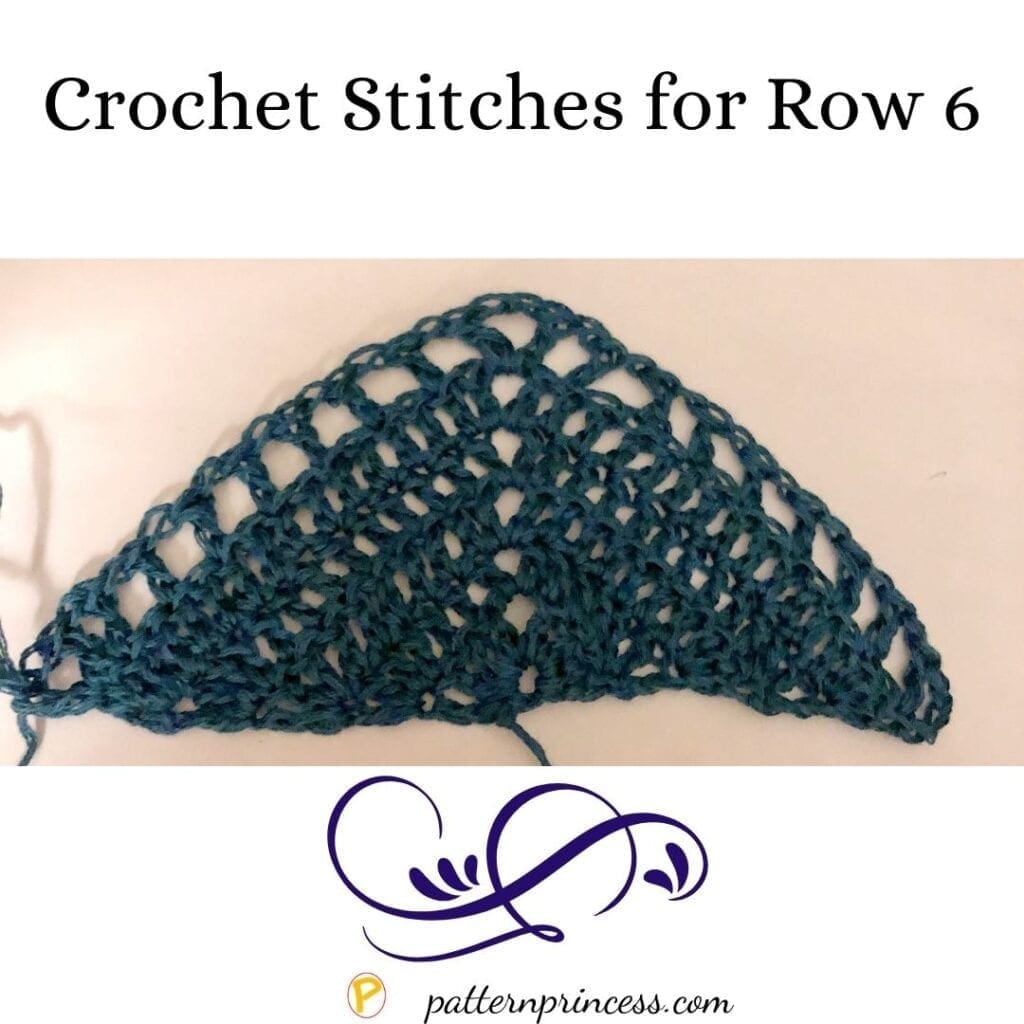
Row 6
CH 4 (Counts as DC, CH 1). DC in the same ST. [CH 1, SK 1, DC in the next ST]. Repeat until 1 ST remains before the CH 1 SP of the previous row. Work (CH 1, DC, CH 2, DC, CH 1) in the CH 1 SP. SK the first DC, [DC in the next ST, CH 1, SK 1] repeat until the last ST. Work (DC, CH 1, DC). Turn (20 DC, 20 CH SP)
Row 7
CH 4 (Counts as DC, CH 1). Then work (DC, CH 1, DC) in the first CH ST SP of the previous row. [CH 1, SK the DC, DC in the next CH ST SP]. In the middle CH 2 SP work (CH 1, DC, CH 2, DC, CH 1). [DC in the next CH 1 SP, CH 1 SK the DC]. Repeat until the last CH 1 SP and work (DC, CH 1, DC, CH 1). DC in the last ST. (24 DC, 24 CH SP)
Row 8
Repeat row 7 (28 DC, 28 CH SP)
Row 9
Repeat row 7 (32 DC, 32 CH SP)
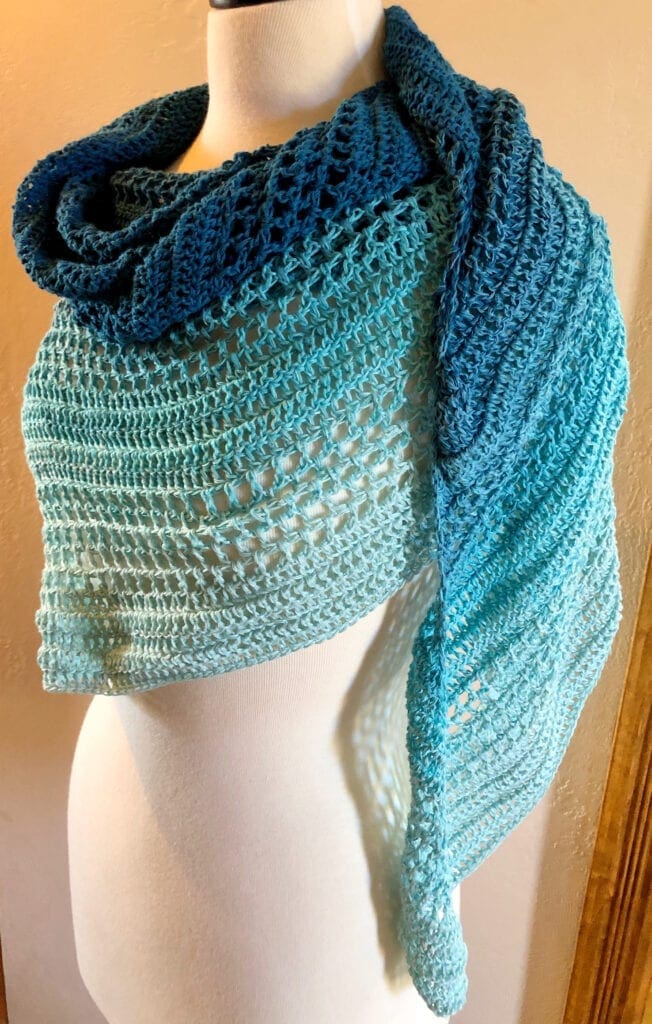
Row 10
Repeat row 7 (36 DC, 36 CH SP)
Row 11
Repeat row 3 (74 DC, 1 CH SP)
Row 12
Repeat row 3 (80 DC, 1 CH SP)
Row 13
Repeat row 3 (86 DC, 1 CH SP)
Row 14
Repeat row 3 (92 DC, 1 CH SP)
Row 15
Repeat row 3 (98 DC, 1 CH SP)
Row 16
Repeat row 6 (54 DC, 54 CH SP)
Row 17
Repeat row 7 (58 DC, 58 CH SP)
Row 18
Repeat row 7 (62 DC, 62 CH SP)
Row 19
Repeat row 7 (66 DC, 66 CH SP)
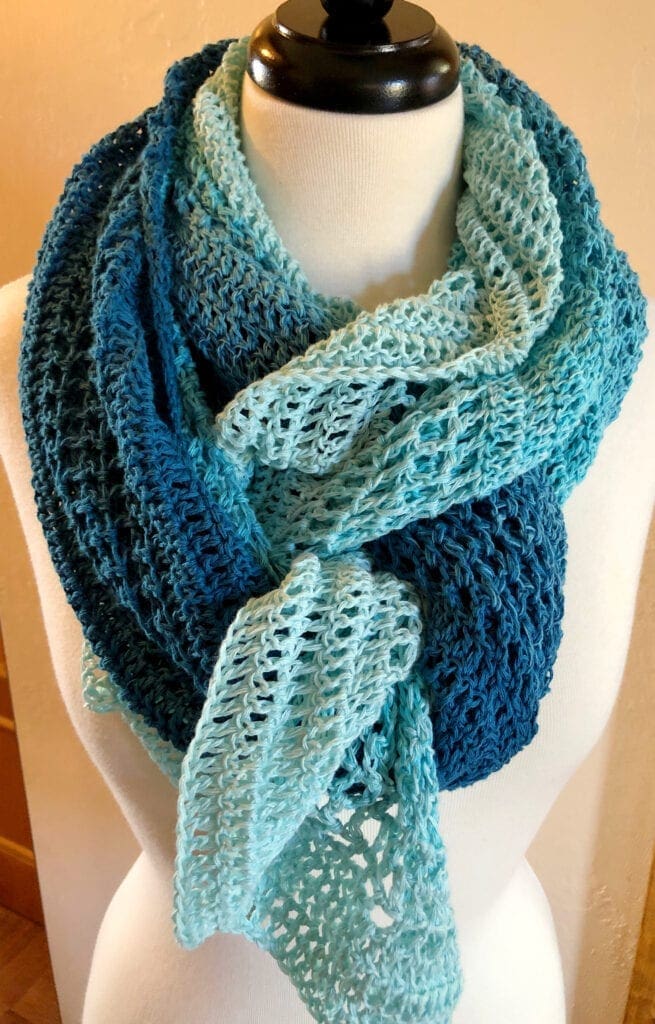
Row 20
Repeat row 7 (70 DC, 70 CH SP)
Row 21
Repeat row 3 (144 DC, 1 CH SP)
Row 22
Repeat row 3 (150 DC, 1 CH SP)
Row 23
Repeat row 3 (156 DC, 1 CH SP)
Row 24
Repeat row 3 (162 DC, 1 CH SP)
Row 25
Repeat row 3 (168 DC, 1 CH SP)
Row 26
Repeat row 6 (88 DC, 88 CH SP)
Row 27
Repeat row 7 (92 DC, 92 CH SP)
Row 28
Repeat row 7 (96 DC, 96 CH SP)
Row 29
Repeat row 7 (100 DC, 100 CH SP)
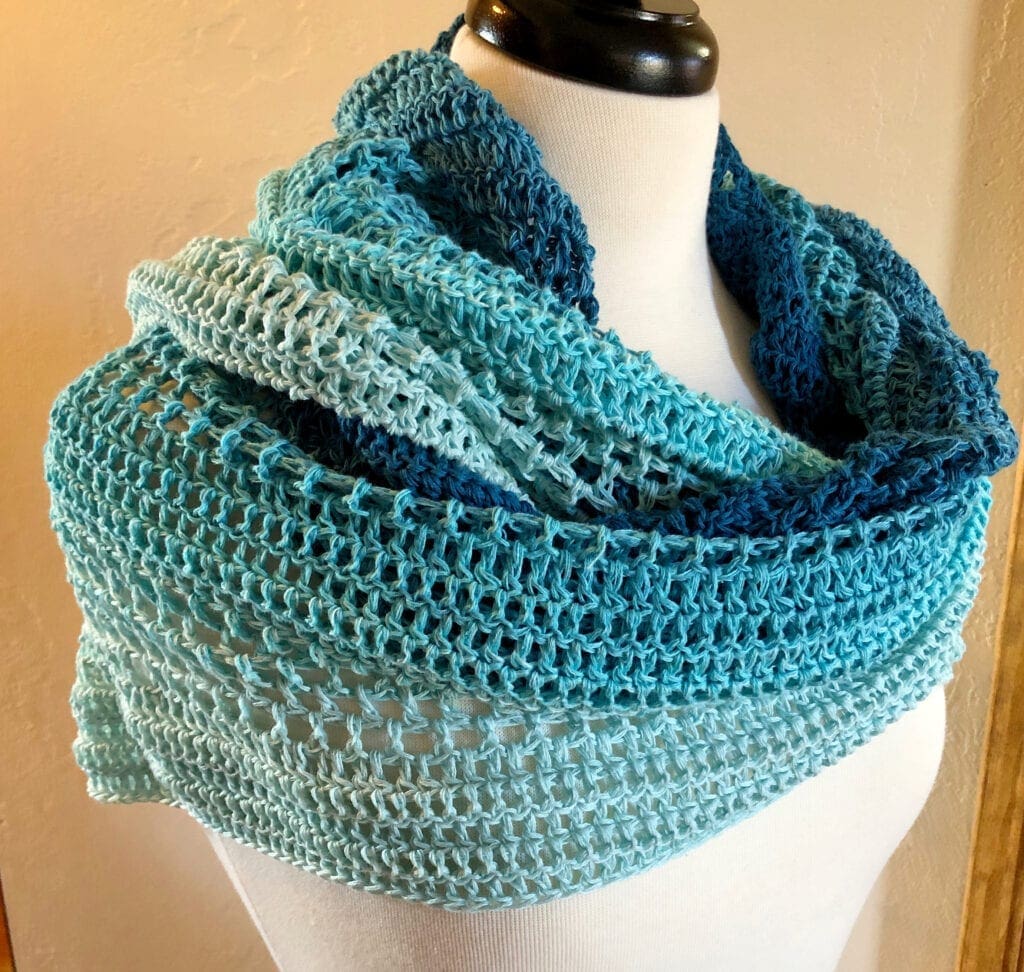
Row 30
Repeat row 7 (104 DC, 104 CH SP)
Row 31
Repeat row 3 (212 DC, 1 CH SP)
Row 32
Repeat row 3 (218 DC, 1 CH SP)
Row 33
Repeat row 3 (224 DC, 1 CH SP)
Row 34
Repeat row 3 (230 DC, 1 CH SP)
Row 35
Repeat row 3 (236 DC, 1 CH SP)
Row 36
Repeat row 6 (122 DC, 122 CH SP)
Row 37
Repeat row 7 (126 DC, 126 CH SP)
Row 38
Repeat row 7 (130 DC, 130 CH SP)
Row 39
Repeat row 7 (134 DC, 134 CH SP)
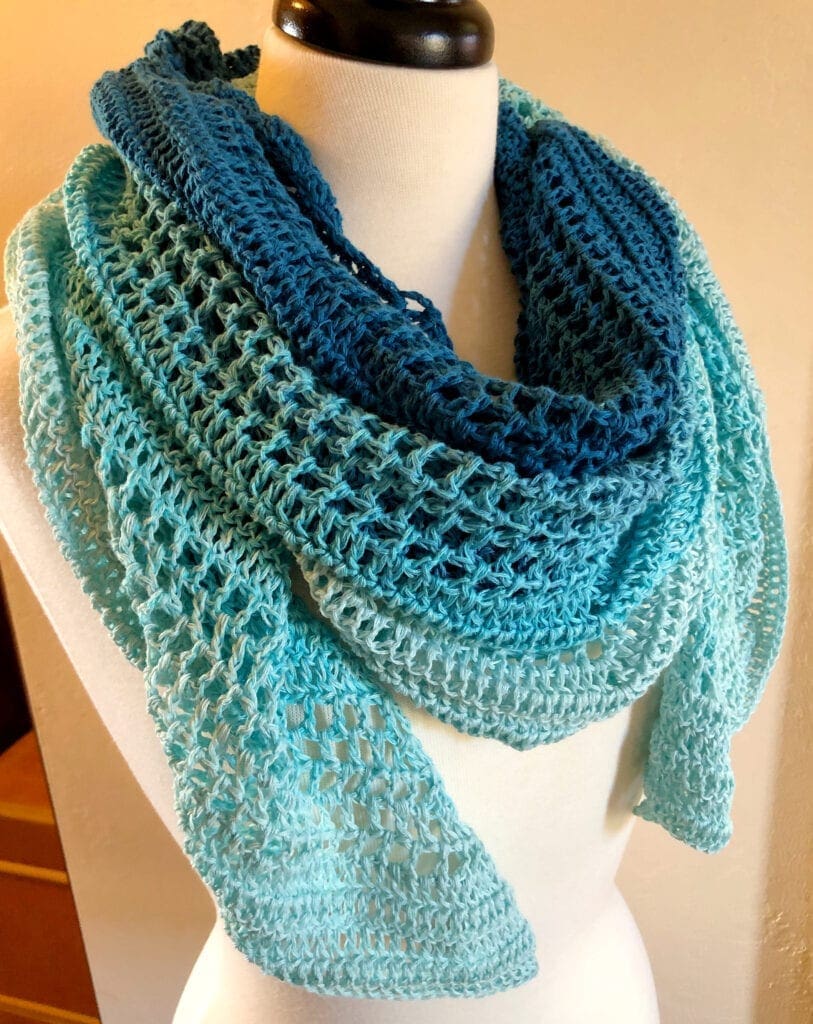
Row 40
Repeat row 7 (138 DC, 138 CH SP)
Row 41
Repeat row 3 (280 DC, 1 CH SP)
Row 42
Repeat row 3 (286 DC, 1 CH SP)
Row 43
Repeat row 3 (292 DC, 1 CH SP)
Row 44
Repeat row 3 (298 DC, 1 CH SP)
Row 45
Repeat row 3 (304 DC, 1 CH SP)
Row 46
Repeat row 6 (156 DC, 156 CH SP)
Row 47
Repeat row 7 (160 DC, 160 CH SP)
Row 48
Repeat row 7 (164 DC, 164 CH SP)
Row 49
Repeat row 7 (168 DC, 168 CH SP)
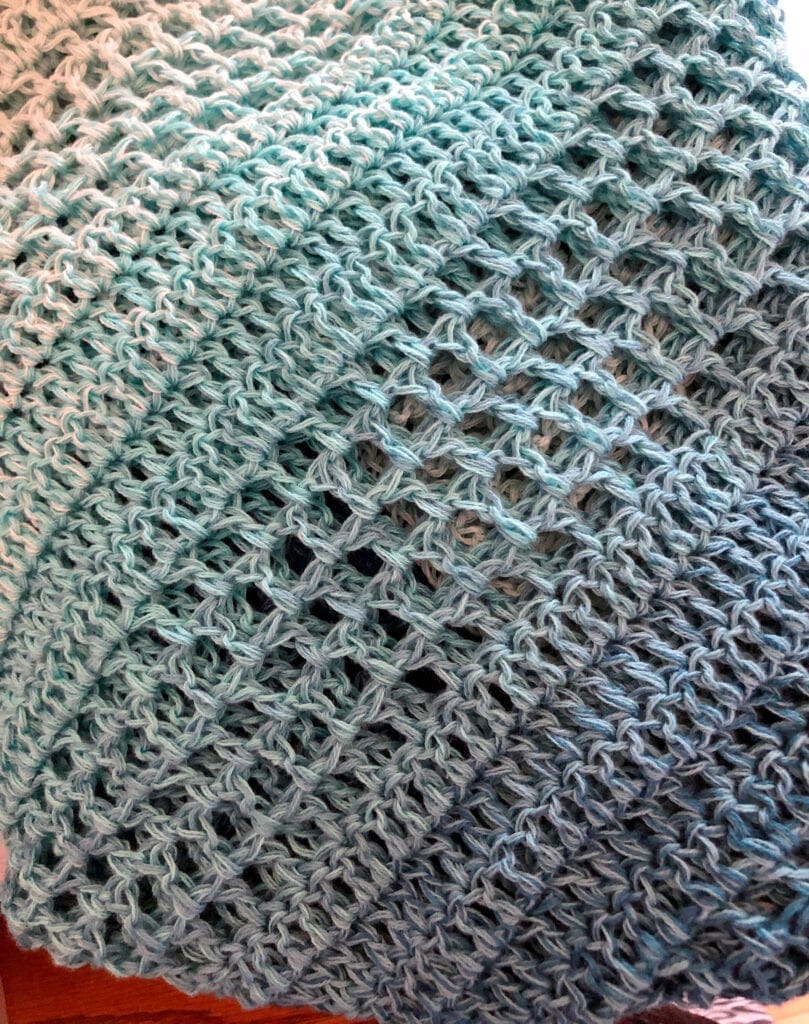
Row 50
Repeat row 7 (172 DC, 172 CH SP)
Row 51
Repeat row 3 (348 DC, 1 CH SP)
Row 52
Repeat row 3 (354 DC, 1 CH SP)
Row 53
Repeat row 3 (360 DC, 1 CH SP)
Row 54
Repeat row 3 (366 DC, 1 CH SP)
Row 55
Repeat row 3 (372 DC, 1 CH SP)
Finishing
I like to make sure that this fine yarn is weaved through quite well; therefore, I use a 12–16-inch tail to weave in. Sometimes, I will also make a knot just to make sure it is secure.
Video Tutorials of this Crochet Pattern
If you loved this post, please share. It helps to show me that these types of posts are helpful – thank you!
I hope that you liked this pattern. If you are looking for more ideas for crocheted projects, here are a few others you may enjoy.

You can find Victoria crocheting, quilting, and creating recipes. She has cooked in restaurants for over 20 years, including many larger parties. She learned to crochet when she was just 11 years old and has been crocheting ever since; over 50 years now. Over 40 years ago, she loved her first class in sewing and continues to hone her skills in quilting. Many have enjoyed the handmade gifts over the years. In her professional career, she has worked in management in a wide variety of businesses including higher education as a dean of a division. All the while attending college part-time to achieve her doctorate in higher education with an emphasis in e-learning.
